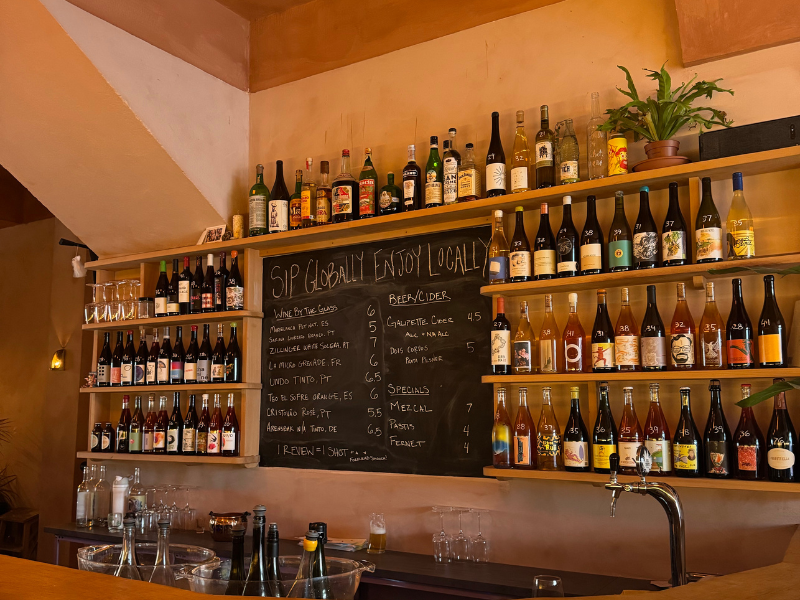
What Is Natural Wine? Why This Minimal-Intervention Style Is Turning Heads
|
|
Time to read 4 min
|
|
Time to read 4 min
Natural wine. You’ve seen the labels, spotted it on the coolest wine lists, maybe even had a glass that tasted a little wild – but what is natural wine, really?
At Crushed & Cured, we’re big fans of bottles with character – wines that speak of where they’re from and how they’re made. Natural wine fits that brief, and then some.
Natural wine is made with as little intervention as possible – in the vineyard and in the winery. Think of it as a stripped-back approach: grapes farmed organically or biodynamically, picked by hand, and fermented using only the yeasts that naturally occur on the grapes.
Once in the cellar, there’s minimal tinkering. That means no added flavourings, colourings, or heavy filtration – and little to no sulphur added.
The result? Wines that are often a little cloudier, a little funkier, and full of life. You get more variation between bottles, and sometimes a few unpredictable twists and turns – but that’s part of the magic.
For many drinkers, the appeal of natural wine lies in its authenticity. It feels closer to the vineyard, the season, and even the winemaker’s philosophy. Asking what is natural wine is really asking why so many producers are choosing honesty over polish. These bottles can taste raw, vibrant, and sometimes surprising – but always alive. Whether you love the unexpected funk or prefer the softer side, natural wine offers an experience that’s as much about discovery as it is about flavour.
Here’s where it gets confusing – because not all natural wine is organic, and not all organic wine is natural.
Put simply: all biodynamic wines are organic. Some organic wines are natural. But not all natural wines are certified anything – it’s more of a philosophy than a rulebook. So, when people ask what is natural wine, part of the answer is that it doesn’t fit neatly into legal definitions. It’s about intention, process, and transparency – and that’s what makes it so intriguing.
It depends! Some are light, crisp, and bright. Others are more earthy, cloudy, and wild. You might taste slight spritziness or a little funk on the nose. Some bottles taste ‘alive’, and others – yes – can go a bit wrong.
But when they’re good, they’re unforgettable. Natural wines often have incredible energy and freshness, and they’re great food wines too. They pair especially well with seasonal, simple dishes, letting both the wine and the food shine without one overpowering the other.
So, what is natural wine meant to taste like? The truth is there’s no single answer. Each bottle reflects the grape, the place, and the minimal intervention approach of the winemaker. That means you’ll find more variation and surprise than in conventional wines, but also more moments of discovery. One vintage might taste wild and untamed, while another feels pure, juicy, and refreshing. It’s this unpredictability – the sense that the wine is alive – that keeps so many people coming back for more.
If you’re new to natural wine and want to dip your toe in, these are a few bottles we love to introduce people to:
Vibrant aromas of peach and tropical fruits are layered with buttery notes and balanced by a refreshing natural acidity. A great gateway natural white.
Deep amber colour, the nose is elegant with sweet aromas of stone fruits, mineral and anise, supported by apricot, mirabelle plum and citrus notes. Full and well rounded on the palate, with plenty of weight, yet still elegant, lively and light in body
This cuvée, unfiltered, unfined and without added sulphite, is as natural as they come and can present a slight deposit in the bottle. Light, fresh with mouthwatering juicy red fruits. Think picnic perfection.
Natural wine isn’t a trend – it’s a return to tradition. It’s wine made with minimal interference and maximum respect for the grape. At Crushed & Cured, we love it because it’s expressive, exciting, and full of stories – just like the winemakers behind it.
So, if you’ve ever wondered what is natural wine really all about, the best way to learn is to taste it for yourself. Each bottle offers something different – sometimes wild, sometimes subtle, always full of character.
Curious? Shop our Natural Wines or pop into the deli for a chat and a taste.